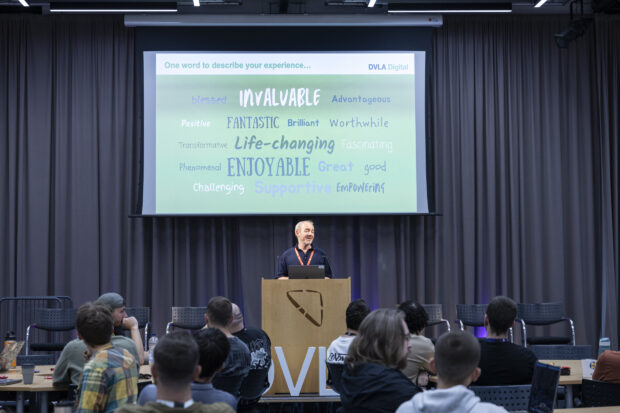In 2018, we launched the Centre of Digital Excellence (CoDE) development programme to attract people to work and develop their digital skills at DVLA. The programme is part of our long term strategy to train people in the digital capabilities we need most.
Several years later, CoDE has delivered significant results, with more than 200 people joining the programme since it began. Many of our engineers and analysts are graduates from the programme, with some teams now comprising up to 50% CoDE graduates!
In this blog, I want to answer some of the questions you may have and offer practical advice for future CoDE students.

Are all CoDE apprentices school leavers?
Not always. While we welcome school leavers, we also recruit people seeking a career change. They often bring valuable life and work experience.
We run a range of different programmes each year – master’s, graduate schemes, and apprenticeships – with varying qualification requirements. Some go to university, while others prefer not to. We want to offer opportunities to the right people, regardless of the route they've taken.
Can you train people from non-IT backgrounds?
Absolutely! For example, our Master’s in Software Engineering programme accepts applicants with any degree in science, technology, engineering and mathematics (STEM).
We've maintained a 50/50 split between non-IT and technology degree participants, with non-IT graduates showing a slightly higher success rate in securing permanent roles.
Can you only succeed with a degree?
No. Many of our apprentices have progressed to become senior engineers. We focus on what applicants do in their own time to develop their skills, which can be a stronger indicator of future success and lead to excellent outcomes.
What advice would you give to future cohorts?
- Say yes to opportunities and don’t be afraid to step outside of your comfort zone.
Whether it's a task for your team, a speaking opportunity, or writing your own blog, every opportunity you take builds your skills, network and experience. These experiences will set you apart.
2. Never turn down small opportunities.
If someone asks if you want to see code they've written, look at a new testing process, or help with a ticket, try to prioritise it. These small gestures show people want to share their knowledge with you.
3. Be proactive and ask questions.
Write down anything you can't ask immediately and follow up afterwards. There are no stupid questions, and curiosity shows engagement!
4. Take advantage of your unique environment.
You're likely working with other current students or previous graduates. Since we run annual programmes, you're never alone in this experience. Ask them what helped them succeed and make notes of what works for you to share with future cohorts.
5. Keep learning.
We probably hired you because you told us you enjoy learning about new technology or building things in your spare time. Don't stop now. Nothing demonstrates your commitment like showing you've been reading up on topics discussed and want to get more involved.
Looking ahead
With the right support, people from all backgrounds can build successful digital careers. Each new group brings fresh perspectives that strengthen our teams and enhance our capabilities.
We're committed to continuing this programme's development, learning from every year, and expanding opportunities for future students. As we celebrate the arrival of the 2025 CoDE cohort, we’re already laying the groundwork for 2026.
Keen to find out more? Check out our development programmes and sign up to Civil Service Jobs to be the first to hear about future opportunities.
Follow DVLA on X, follow us on Facebook and connect with us on LinkedIn. You can also subscribe to the DVLA digital services blog.